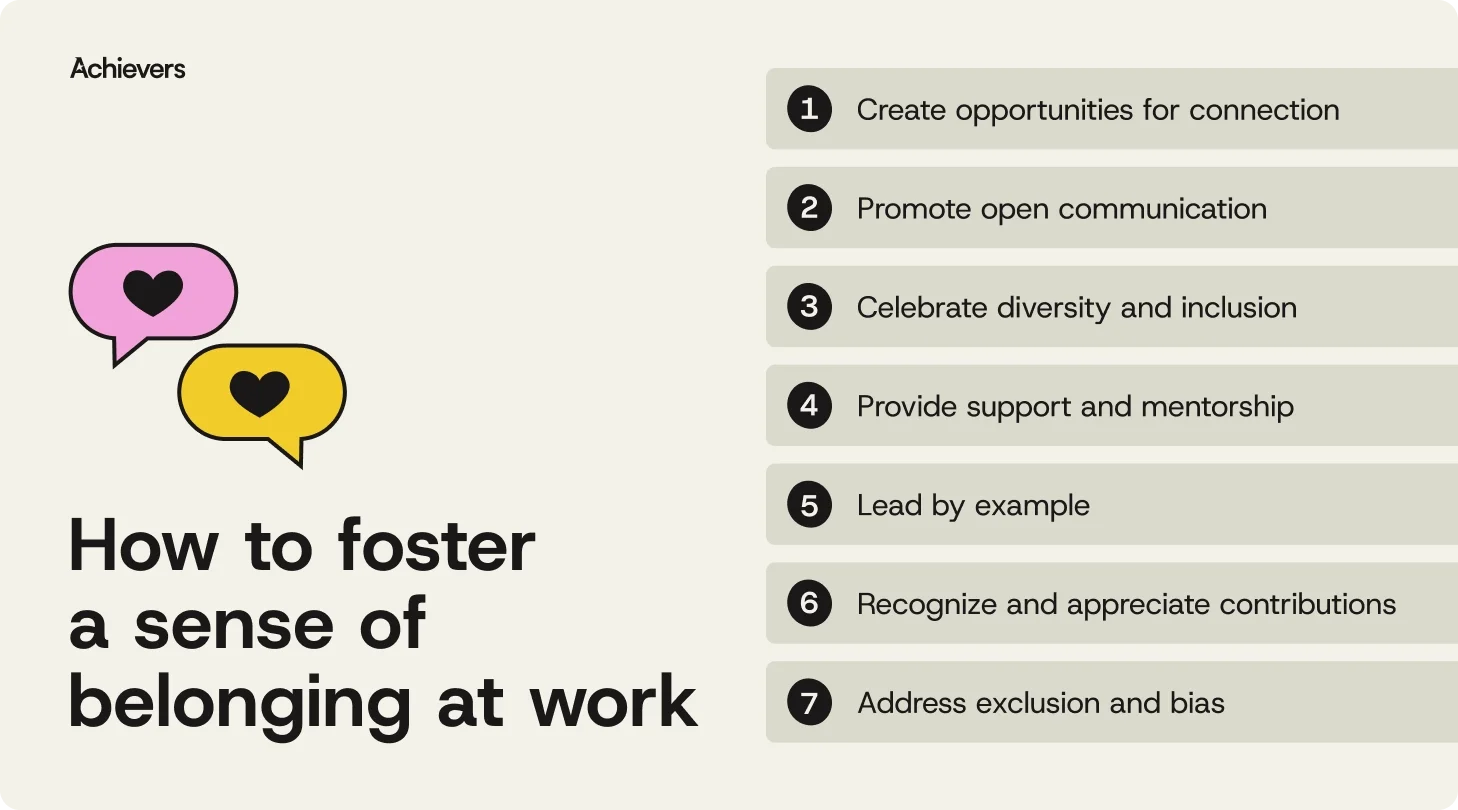Table of contents
Create a culture that means business™
Schedule a demo with an Achievers solution expert today.
Belonging isn’t a bonus. It’s the baseline. That’s why 94% of employees say feeling like they belong at work is very important. And they’re right — because when people feel seen, heard, and valued, they don’t just show up. They lean in.
Belonging starts with recognition. Not the once-a-year kind, but regular, meaningful moments that say: You matter here.
The payoff? Big. Achievers Workforce Institute (AWI) research shows employees with a strong sense of belonging are 10x more likely to recommend their company as a great place to work — and they’re more engaged, too.
So, here’s the question: Is your organization ready to commit to building a culture where everyone feels they belong? If you are, we’re right there with you — recognition at the ready.
7 ways to foster a sense of belonging at work
Belonging doesn’t happen by accident — it’s something you build, brick by brick, through daily actions and intentional choices. And while there’s no one-size-fits-all playbook, there are proven ways to help your people feel seen, valued, and connected. From team rituals to leadership behaviors to manager effectiveness, every moment matters. Here are seven ways to create a culture where belonging isn’t just encouraged — it’s expected.

1. Create opportunities for connection
People are social creatures — even introverts. Building belonging starts with creating space for employee connection that’s natural, frequent, and inclusive. When people have opportunities to engage as humans, real relationships grow.
Try this:
2. Promote open communication
Belonging thrives when people know their voice matters. That starts with honest dialogue, consistent listening, and action that follows. Communication should be a two-way street — not a dead end.
Here’s how to open the door:
3. Celebrate diversity and inclusion
Real belonging happens when people feel respected for who they are — not who they’re expected to be. That means valuing differences and making space for every perspective. Representation is important, but inclusion is what makes it meaningful.
Build an inclusive culture by:
4. Provide support and mentorship
No one succeeds alone. Creating a culture of belonging means making sure employees feel supported — not just in their work, but as whole people. That includes supporting them with everything from career mentorship to wellness programs.
Support your people with:
5. Lead by example
Culture starts at the top — and people notice what leaders do far more than what they say. Empathetic leadership sets the tone by creating space for authenticity, inclusion, and trust. That’s when belonging stops being a concept — and becomes a daily reality.
Set the tone by:
6. Recognize and appreciate contributions
Recognition tells people they matter — and it doesn’t have to be big or flashy. Frequent and meaningful employee recognition is one of the fastest ways to foster belonging. Everyone wants to feel seen.
Make recognition meaningful by:
7. Address exclusion and bias
Even the best cultures can have blind spots. Belonging means actively rooting out exclusion and bias — not waiting for someone to call it out. It means empowering women in the workplace, showing up for Pride Month, and so much more. That takes reflection, accountability, and the courage to do better.
Start here:
What belonging really looks like
Belonging isn’t a warm-and-fuzzy concept — it’s the foundation of a high-performing culture. When employees feel like they truly belong, here’s what’s happening:
- They feel seen and valued: Their work is recognized, their voice matters, and their perspective isn’t just welcomed — it’s respected.
- They feel part of the crew: Relationships go beyond job titles. There’s connection, collaboration, and maybe even a shared meme or two.
- They feel safe to be real: No code-switching, no second guessing. Just people being people, without fear of judgment.
- They feel connected to a bigger picture: Their work isn’t happening in a vacuum. They understand how it drives impact — and why it matters.
When employees experience all of the above, you don’t just have a team. You have a workforce that’s ready to thrive.
Why belonging matters
Belonging isn’t just good for employee morale — it’s a serious performance driver. When employees feel like they belong, they’re more engaged in their work and more likely to go the extra mile (often without being asked twice). That kind of motivation leads directly to higher productivity, greater creativity, and better results across the board.
Recognition plays a major role in making belonging real. According to the 2025 State of Recognition report:
- Employees who receive meaningful recognition monthly are 6x more likely to feel a sense of belonging
- Employees who receive recognition weekly are 9x more likely to feel a strong sense of belonging
- Employees who are regularly recognized by their manager are 11.7x more likely to feel a strong sense of belonging
It also keeps people around. Employees who feel valued and connected are far less likely to browse job boards on their lunch break. In fact, belonging is one of the strongest predictors of retention.
And let’s not forget the human side. Feeling accepted and supported isn’t just good for business — it’s good for people. It boosts employee satisfaction, mental well-being, and overall happiness at work.
Finally, belonging strengthens teams. When people feel like they’re part of something real, they show up for each other — collaborating more, communicating better, and building the kind of trust that powers high-performing cultures.
Activating the five pillars of belonging at work
Belonging isn’t built overnight. It takes consistent action across five key areas: feeling welcomed, known, included, supported, and connected. These pillars form the foundation of a workplace where people feel they truly belong — and thrive because of it:
- Welcomed: First impressions stick. A thoughtful, personalized onboarding experience helps new hires feel like they’re part of something from day one. Recognition, social introductions, and early involvement in culture-building activities make all the difference.
- Known: When employees feel understood — beyond their job titles — they engage more deeply. Tailor coaching, communication, and recognition to reflect who they are, not just what they do.
- Included: Belonging means every voice is heard. Foster inclusion by supporting ERGs, encouraging diverse perspectives, and showing employees their input drives change — not just conversation.
- Supported: Support goes beyond job tools. Empower employees through coaching, development opportunities, and flexibility in the workplace. When people know someone’s got their back, they do their best work.
- Connected: Belonging thrives on real relationships. Encourage team-building, cross-functional collaboration, and social touchpoints — online or off. The stronger the connections, the stronger the culture.
Belonging starts with recognition — and recognition starts with you
Recognition isn’t a perk — it’s the foundation of belonging. Employees who were recognized in the past week are nearly five times more likely to feel a strong sense of belonging than those who weren’t. That’s a stat worth paying attention to.
To create a culture where everyone feels like they belong, recognition needs to be frequent, meaningful, and easy to give — no matter where or how your teams work. Social recognition builds connection in real time, while flexible, points-based rewards let employees feel valued in ways that actually resonate. (Because nobody dreams of earning another branded tote.)
At Achievers, we help organizations embed recognition and feedback into their everyday culture — not just during annual reviews or milestone moments. When recognition is part of the rhythm of work, belonging becomes more than a value. It becomes your competitive edge.
The result? Higher engagement, stronger retention, and a workplace where people feel safe, seen, and motivated to do their best. If you’re ready to build a culture where everyone feels like they truly belong — Achievers can help you get there.
Sense of belonging at work FAQs
Planning team-building, hosting social events or coffee chats, and sparking connections through collaboration.
Fostering open conversations, training managers in empathy, and using feedback tools that drive action.
Celebrating cultural moments, prioritizing diverse leadership, and creating safe spaces for dialogue.
Providing mentorship, offering wellness resources, and holding regular, agenda-free manager check-ins.
Practicing inclusive behaviors, owning blind spots, continuing to learn, and elevating underrepresented voices.
Recognizing often and inclusively, celebrating big wins and small efforts, and encouraging peer-to-peer praise.
Auditing hiring, promotion, and feedback, creating safe channels for concerns, and investing in DEI training with accountability.



